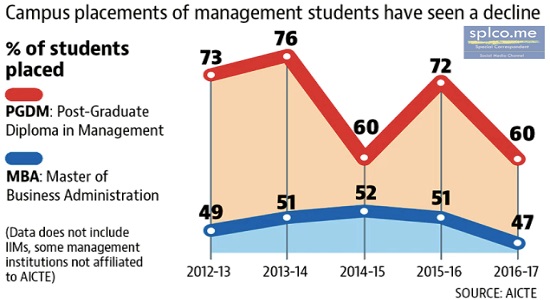In 2016-17, just 47% of Master of Business Administration (MBA) graduates got placed on the campus, a dip of 4% over the previous year, marking a five-year low. At 12%, the drop was far sharper for postgraduate diploma holders.

Job offers for fresh management graduates in India are at a five-year low, official data show, a trend experts blame on a sluggish economy as well as a mismatch between the years-old curriculum and industry expectations.
The data does not include the premier Indian Institutes of Management (IIMs) that are not affiliated to the main regulatory body, the All India Council for Technical Education (AICTE). There are an estimated 5,000 management institutes across the country. About 200,000 students passed out of these institutes in 2016-17.
The trend has AICTE officials worried. “It is a market-driven process and hence placements are dependent on that. We have taken cognisance of that (and) are updating and reviewing the curriculum so that it meets the requirement of the industry,” said a senior AICTE official on the condition of anonymity.
“The industry is on the lookout for job-ready people which most MBA grads are not (barring those in IIMs and other top B-schools where placement is high),” said Pankaj Bansal, co-founder and CEO, PeopleStrong, a leading HR company.
Until about a decade ago, management studies in India were largely restricted to the IIMs and some top private institutes. As the economy grew, demand for management graduates too soared, leading to a spurt in new private and government-backed institutes.
But in the absence of competent faculty and industry training facilities, most B-schools began churning out graduates who were far from being job-ready.
AICTE officials say revising the management syllabi for 3,500 affiliated institutes. The engineering curriculum is also being updated.
“The major issue is the quality of these institutions as they not being able to align with the industry expectations. What the industry needs today they are not able to provide,” said Kamal Singh, executive director and CEO of United Nations Global Compact, India, a UN organisation looking into quality education.
“Those who are not able to provide first-hand internship to students in good companies also suffer when it comes to placements.” he added.














